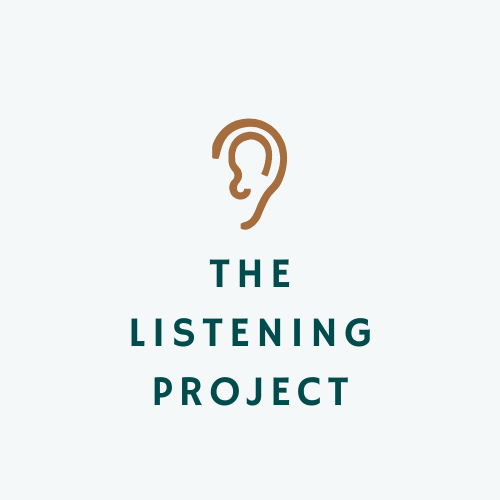I have been thinking, since celebrating the second anniversary of the project in late June, about whether there is anything specific that I can distill from this experience, from having had 600+ people join me, from these tremendously varied interactions and the threads and emotions that arise from these interactions.
I find myself reflecting repeatedly on why it seems so hard for many of us to listen. I am not sure, but I have a feeling that there is something – or there are some things – we don’t understand about listening. I think of listening as a kind of habit, something that doesn’t necessarily come naturally, but that can and will become a part of the pattern of your life and the way that you walk through the world if you practice it consciously, somewhat akin to brushing your teeth, balancing your checkbook (am I the only person who still does that?), or calling your mother. The thing is, I think that we live with this pretense that listening is natural, that it’s easy, that it’s like breathing, something that we just do – and, taking that attitude, we end up not doing much of it all: not real, high-quality, gold-standard listening anyway.
Part of the problem is that we rarely see the real thing modeled for us. When was the last time that you sat with someone, perhaps one of the most trusted people in your life, and were listened to without interruption for an hour and a half, or 45 minutes, or even five minutes? My guess is that it wasn’t recently, if ever. So, one of the things that we may not understand about listening, is what quality listening really is, at its core. Quality listening, I’d suggest, is a very conscious act of giving. You are opening your coin purse of psychic golden listening doubloons and pouring them freely into the metaphorical opened hands of whoever you are listening to. You are sharing the wealth that is your care and love and real concern and personal investment with that person, unconcerned about any return on that investment in that moment. But how can you do that if you don’t know what it is to listen, or to be listened to?
We teach our children all kinds of things that become hardwired in their psyches and daily lives: brushing their teeth, looking both ways before crossing the street, locking the front door when they’re leaving. But have I ever heard a parent say to a child, ‘Listen to what your sister is telling you, don’t interrupt her, really try to understand what she is telling you’? I don’t think so. Just as we talk very little about sex, which is a different form of communication, we talk very little if at all about listening, about the expectations that we have with others for how we’re going to exhibit respect and care and love for them by really listening to them, and what we need from others in terms of their dedication to hearing us.
I could say that dedicated, quality listening is hard, and that is why there is so little of it that takes place. But perhaps listening is hard in the same way that many things we do are hard at first, like riding a bike, learning how to type, taking on a new job with all of its constituent parts and processes that we haven’t done before. The things that begin hard often become second nature to us. They are not inherently hard, like algebra, or knocking down all three milk bottles at the fair to win the giant-size stuffed possum. So I go back to the thought that the problem with listening may be that it appears to be simple to us, something that we’ve been doing since birth, nothing that needs to be learned. What I’m talking about there is hearing, I think – we cannot help but ‘hear’. Listening however, at its best, is an active thing, a willful act, a positive act. Listening is work that can become second nature if we practice it consistently. Quality listening, I think, need not be hard to do after a while, if we feel the value in it, dedicate ourselves to it, and experience the rewards that stem from it.
